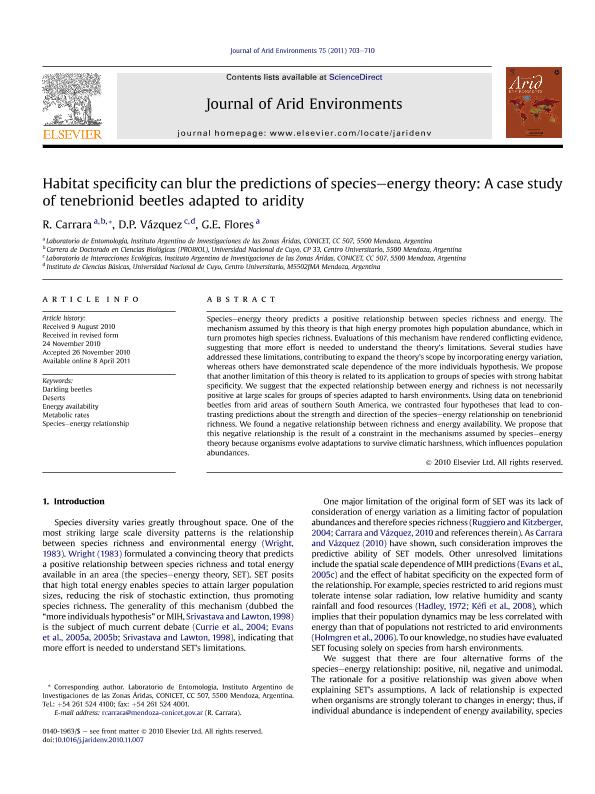Mostrar el registro sencillo del ítem
dc.contributor.author
Carrara, Rodolfo

dc.contributor.author
Vazquez, Diego P.

dc.contributor.author
Flores, Gustavo Ernesto

dc.date.available
2018-08-16T03:05:05Z
dc.date.issued
2011-08
dc.identifier.citation
Carrara, Rodolfo; Vazquez, Diego P.; Flores, Gustavo Ernesto; Habitat specificity can blur the predictions of species-energy theory: A case study of tenebrionid beetles adapted to aridity; Academic Press Ltd - Elsevier Science Ltd; Journal of Arid Environments; 75; 8; 8-2011; 703-710
dc.identifier.issn
0140-1963
dc.identifier.uri
http://hdl.handle.net/11336/55817
dc.description.abstract
Species-energy theory predicts a positive relationship between species richness and energy. The mechanism assumed by this theory is that high energy promotes high population abundance, which in turn promotes high species richness. Evaluations of this mechanism have rendered conflicting evidence, suggesting that more effort is needed to understand the theory's limitations. Several studies have addressed these limitations, contributing to expand the theory's scope by incorporating energy variation, whereas others have demonstrated scale dependence of the more individuals hypothesis. We propose that another limitation of this theory is related to its application to groups of species with strong habitat specificity. We suggest that the expected relationship between energy and richness is not necessarily positive at large scales for groups of species adapted to harsh environments. Using data on tenebrionid beetles from arid areas of southern South America, we contrasted four hypotheses that lead to contrasting predictions about the strength and direction of the species-energy relationship on tenebrionid richness. We found a negative relationship between richness and energy availability. We propose that this negative relationship is the result of a constraint in the mechanisms assumed by species-energy theory because organisms evolve adaptations to survive climatic harshness, which influences population abundances.
dc.format
application/pdf
dc.language.iso
eng
dc.publisher
Academic Press Ltd - Elsevier Science Ltd

dc.rights
info:eu-repo/semantics/openAccess
dc.rights.uri
https://creativecommons.org/licenses/by-nc-sa/2.5/ar/
dc.subject
Darkling Beetles
dc.subject
Deserts
dc.subject
Energy Availability
dc.subject
Metabolic Rates
dc.subject
Species-Energy Relationship
dc.subject.classification
Otras Ciencias Biológicas

dc.subject.classification
Ciencias Biológicas

dc.subject.classification
CIENCIAS NATURALES Y EXACTAS

dc.title
Habitat specificity can blur the predictions of species-energy theory: A case study of tenebrionid beetles adapted to aridity
dc.type
info:eu-repo/semantics/article
dc.type
info:ar-repo/semantics/artículo
dc.type
info:eu-repo/semantics/publishedVersion
dc.date.updated
2018-07-11T14:36:42Z
dc.journal.volume
75
dc.journal.number
8
dc.journal.pagination
703-710
dc.journal.pais
Países Bajos

dc.journal.ciudad
Amsterdam
dc.description.fil
Fil: Carrara, Rodolfo. Consejo Nacional de Investigaciones Científicas y Técnicas. Centro Científico Tecnológico Conicet - Mendoza. Instituto Argentino de Investigaciones de las Zonas Áridas. Provincia de Mendoza. Instituto Argentino de Investigaciones de las Zonas Áridas. Universidad Nacional de Cuyo. Instituto Argentino de Investigaciones de las Zonas Áridas; Argentina. Universidad Nacional de Cuyo; Argentina
dc.description.fil
Fil: Vazquez, Diego P.. Consejo Nacional de Investigaciones Científicas y Técnicas. Centro Científico Tecnológico Conicet - Mendoza. Instituto Argentino de Investigaciones de las Zonas Áridas. Provincia de Mendoza. Instituto Argentino de Investigaciones de las Zonas Áridas. Universidad Nacional de Cuyo. Instituto Argentino de Investigaciones de las Zonas Áridas; Argentina. Universidad Nacional de Cuyo. Facultad de Ciencias Exactas y Naturales; Argentina
dc.description.fil
Fil: Flores, Gustavo Ernesto. Consejo Nacional de Investigaciones Científicas y Técnicas. Centro Científico Tecnológico Conicet - Mendoza. Instituto Argentino de Investigaciones de las Zonas Áridas. Provincia de Mendoza. Instituto Argentino de Investigaciones de las Zonas Áridas. Universidad Nacional de Cuyo. Instituto Argentino de Investigaciones de las Zonas Áridas; Argentina
dc.journal.title
Journal of Arid Environments

dc.relation.alternativeid
info:eu-repo/semantics/altIdentifier/url/https://www.sciencedirect.com/science/article/pii/S0140196310003162
dc.relation.alternativeid
info:eu-repo/semantics/altIdentifier/doi/http://dx.doi.org/10.1016/j.jaridenv.2010.11.007
Archivos asociados
